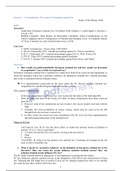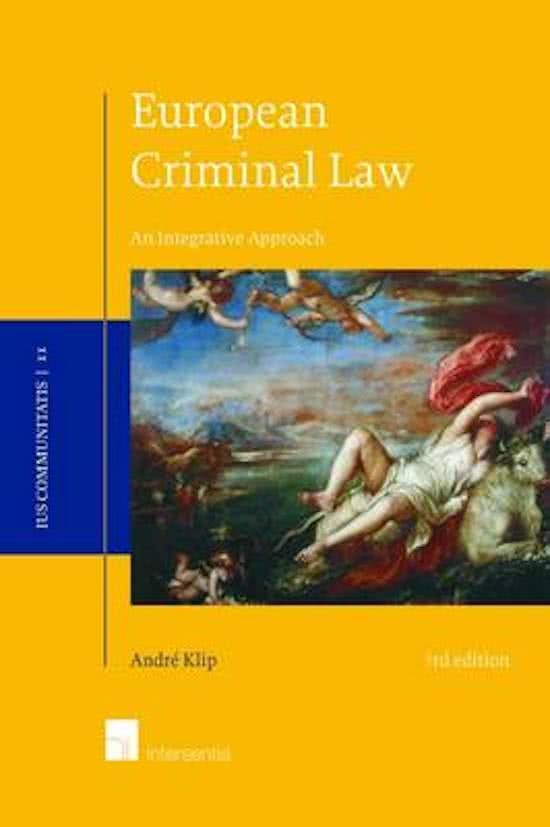Session 1 – An introduction: The context of European criminal law
Week of 5th February 2020
Index
Literature
- André Klip, European Criminal Law, 3rd edition 2016, Chapters 1-2 and Chapter 3, Sections 1-
4.2, pp. 1-94.
- Michele Caianiello, Dum Romae (et Brucsellae) Consulitur…Some Considerations on the
Taricco Judgment and Its Consequences at National and European Level, 24 European Journal
of Crime, Criminal Law and Criminal Justice Issue 1/2016.
Case Law
- C- 68/88, Commission v. Greece, Rep. 1989 (2965)
- C-105/14, 8 September 2015, criminal proceedings against Ivo Taricco and others
- C-42/17, 5 December 2017, criminal proceedings against M.A.S., M.B. (Taricco II)
- C-574/15, 2 May 2018, criminal proceedings against Scialdone
- C-310/16, 17 January 2019, criminal proceedings against Petar Dzivev and Others
Questions
1. How would you understand/define European criminal law and how would you determine
its scope/limits? Can we find it in national law?
Definition: European criminal law is explained as a multi-level field of law (case law and legislation), in
which the European Union has a normative influence on substantive criminal law, criminal procedure
and on the co-operation between Member States.
It is supplemented (aangevuld) by the areas where the EU directly enforces criminal law:
competition law and the European Public Prosecutor’s Office.
With regards to national law:
- In the past: competences in criminal law were exclusively the realm of the individual MS.
- Since the entry into force of the Treaty of Lisbon many competences have been conferred
upon the EU.
However, most of the competences are not exclusive, but shared (jointly exercised with the
MS);
Example: the Union prohibition of insider trading, which must be enforced by the MS
through their own national criminal law;
In other words: the norms have been formulated at the EU level, but their implementation
and enforcement takes place at the national level.
Nature of EU-law
- Van Gend & Loos EU law has direct effect, no matter the national system of dualism or
monism it is a “New Legal Order”
A citizen can directly rely on an article, as long as the provision is:
Clear
Precise
- Costa/ENEL Union Law has priority over national law. Voorrang van Europees recht, het
moet in alle LS hetzelfde zijn
2. What is meant by ‘normative influence’ in the definition of European criminal law in the
literature? How can Union law norms influence national criminal norms? How can
national criminal norms influence EU law?
The EU drafts criminal norms by making use of its competences as granted by the treaties.
EU law influences national criminal law due to the obligations of the MS for the enforcement of Union
law. Meaning that MS might have to enforce Union law by creating criminal law rules or set criminal
law aside because they conflict with Union law.
1
, 3. What is harmonisation and approximation in criminal law matters and what are their
effects?
Integration does not need to take place in a “legal” form.
Harmonisation = it has a legal connotation (distinguish it from integration and mutual recognition)
- Definition: ‘the convergence of the legal practice of the various legal systems based upon a
common standard.’ (de convergentie (naar elkaar toe groeien) van de juridische praktijk van de
verschillende rechtsstelsels op basis van een gemeenschappelijke norm.)
- It can be seen as a legal means for achieving the political objective of integration
Harmonisation implies differences, otherwise there would be nothing to harmonise
Tries to reduce differences, but does not want to eliminate them
- Goal: to arrive at common rules
Effects of harmonisation = harmonization of rules focuses on the implementation of the European rule
into a national setting.
Forms of harmonisation:
- Positive integration means that the Union harmonises the substantive law in a certain field and
as a consequence the discretion of the MS becomes more limited.
- Negative: union law does not force MS to implement specific legislation, but certain actions
may not be hindered/limited/impediment. E.g. the 5 freedoms trigger negative harmonisation.
The consequences of negative integration are thus more determined by the situation in national
law.
Negative integration has more influence on national law.
Legal bases for harmonisation: art. 114-118 TFEU: in policy area the MS must respect the stated
minimum obligations.
Approximation = allows the MS more discretion in the choice of means with which to comply to their
Union Obligations. The line between harmonisation and approximation is not set explicit by Treaties,
law, or the Court.
Artt. 82 and 83 TFEU delineate the areas in which approximation may take place.
Effects:
- Contextual consequences: Harmonisation may result in optimal or unwanted side effects.
Because Criminal law is a closed system (individuals cannot create own criminal law), it may be
difficult to harmonise just a few aspects of criminal law without affecting the system as a whole.
- Will it lead to harmonisation of enforcement when enforcement mechanisms have not been
harmonised
4. Do states have an obligation to enforce Union law via the drafting of national criminal
law?
MS must adopt all measures of national law to implement legally binding acts. But e.g. concerning
directive: the result is binding but MS is free to choose the means to do this. Generally this requires
implementation into national law. But they can choose to use administrative enforcement, civil or
criminal law enforcement. Thus, it depends on the type of secondary legislation.
5. What are the Maize-judgment1 criteria and when are they used?
Greek Maize is undoubtedly the leading case on the requirements of European law on national
enforcement. Greek Maize was about the failure of the Greek state to fulfil those obligations to initiate
all the criminal or disciplinary proceedings provided for by national law against the perpetrators of
1
P. 74 literature.
2
,fraud. The Court ruled that Article 4(3) TEU requires the Member States to take all measures necessary
to guarantee the application and effectiveness of Community law. (Enforcement criteria can be deduced
from art. 4, par. 3 TFEU).
Facts: The Commission had brought proceedings against Greece for failing to establish and pay to the
Community resources that were fraudulently being withheld from the Community budget. This related
to maize imported into Greece from the non-Member State Yugoslavia without a levy being collected,
subsequently declaring the maize to be of Greek origin and then transporting it to another MS, Belgium.
This incident had its origin in allegations of fraud (false declarations) and corruption (bribery and the
frustration of investigations and prosecution).
Why relevant that the goods are transported from MS to MS? because of the free movement of goods
But: it came from a third MS! Yugoslavia, so taxes had to be paid. And the EU is a protective system
for those that are inside the EU.
VAT fraud?
- Within the EU: exempted
- Outside the EU: should be imposed
! Important, because the EU earns money like this
A number of principles to assess the activity of a MS can be deduced from this judgement:
- Assimilation principle
- Effective
- Proportionate
- Dissuasive
- Same diligence
Assimilation principle
The obligation to pay respect to the assimilation principle requires MS to use the same or similar means
of legislation that they would use with regard to similar violations of national law . It is related to the
same diligence principle, but assimilation relates to legislation, and diligence with what MS do with
legislation they have in place.
See example in book: penalty of 6 years and a fine of million euros, prevents it from making it an
administrative penalty.
Problem = what are similar infringements? But since art 83 TFEU = criminalizes certain behavior, the
importance of assimilation has diminished.
Effective
- Must be distinguished from dissuasive. Effective means that if violations occur, the system is
capable of responding to it. It can react to violations of Union law.
- Rules laying down penalties are effective where they are framed in such a way that they do
not make it practically impossible or excessively difficult to impose the penalty provided for
and, therefore, to attain the objectives pursued by Community law. 2
- Taricco case: statute of limitations in Italy would make it impossible to impose sanction on a
large part of VAT offences interruption of criminal proceedings concerning serious fraud in
relation to VAT has the effect of extending the limitation period by only a quarter of its initial
duration, are liable to have an adverse effect on the fulfilment of the Member States’ obligations
under Article 325(1) and (2) TFEU if those national rules prevent the imposition of effective
2
Case: Berlusconi, AG Kokott
3
, and dissuasive penalties in a significant number of cases of serious fraud affecting the financial
interests of the European Union) Thus should the national rule not be applied.
Proportionate
- A penalty is proportionate where it is (that is to say, in particular, effective and dissuasive) for
attaining the legitimate objectives pursued by it, and also necessary. Where there is a choice
between several (equally) appropriate penalties, recourse must be had to the least onerous.
Moreover, the effects of the penalty on the person concerned must be proportionate to the aims
pursued.3
- Should be interpreted as the relation between the gravity/severity of the offence and the sanction
provided.
Dissuasive
A penalty is dissuasive where it prevents an individual from infringing the objectives pursued and rules
laid down by Community law. What is decisive in this regard is not only the nature and level of the
penalty but also the likelihood of its being imposed. Anyone who commits an infringement must fear
that the penalty will in fact be imposed on him. There is an overlap here between the criterion of
dissuasiveness and that of effectiveness. 4
Same diligence
- Requires that the authorities of a MS may not ignore violations of Union law and spend
significant time on cases concerning infringements of national law
- Same effort is required
- Keep in mind difference between opportunity principle and legality principle
- Does the enforcement obligation allow for a decision not to prosecute, despite the prosecution
being convinced that an offence has been committed? The answer depends on the circumstances
of the case.
In summary, three different steps for the enforcement of Union law are therefore apparent:
1. The transposition or implementation into national legislation;
2. The creation if the possibility to invoke Union law in proceedings;
3. The active response to violations of Union rules.
6. In what ways are competition law and criminal law alike?
Competition law: the substantive rules of competition law are directly applicable and there is direct
enforcement power for the Commission. The Commission may set fines itself, and may pursue its own
policy? Competition law is used as criminal law
Case
a. Other members of the Croatian parliament supported that a criminal provision be
introduced, which would sanction falsifications of European elections with a fine of a
maximum of 4.000.000 Croatian Kuna (roughly 500.000 Euro). How would you evaluate
these suggestions?
Maize Criteria: Assimilation principle. The falsification of elections is an infringement on Union Law (I
think: Act concerning the election of the Members of the European Parliament by direct universal
suffrage 20 September 1976 or art. 325 TFEU). Assimilation entails that the Member State uses the
same or similar means of legislation that they (would) use regarding similar violations of national law.
Since they punish election falsification with imprisonment of 5 years or fine. Imprisonment of 5 years is
quite serious so despite their discretion, it prevents the State from making it an administrative offence.
In an alternative scenario, imagine that a criminal legislation punishing the falsification of EU
elections was already enforced before the European elections of 2014. In this scenario, after
3
Case: Berlusconi, AG Kokott
4
Case: Berlusconi, AG Kokott
4





